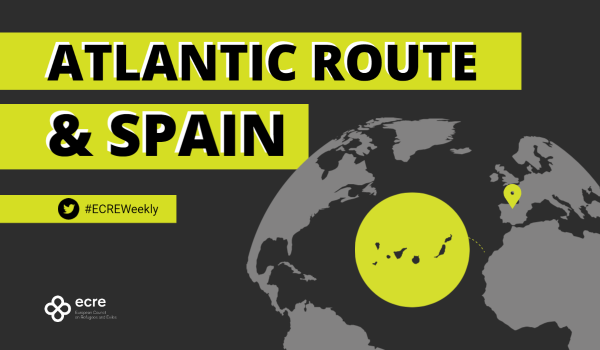Multiple tragedies in the Atlantic Ocean over recent weeks despite rescue efforts. Reports of pullbacks of survivors to Moroccan held Western Sahara by cargo ships in “violation of international agreements”.
Tragedies, as well as rescue operations, continue in the Atlantic Ocean. Caminando Fronteras reported on 14 February that 70 people, including 12 minors under the age of eight, went missing in two separate shipwrecks in the Atlantic Ocean. The first boat carrying 65 people ran adrift along the route of North Africa-Canary Islands on 10 February resulting in the death of 34 people including one child. The survivors recounted that they were beaten and tortured by the Moroccan authorities when they were returned to the port of El Aaiún in Western Sahara. On the same day, a second boat with 56 people on board sank shortly after its departure from Cape Bojador on the west coast of Western Sahara, leaving 36 people dead including five children. On 12 February, 6 people lost their lives on the board of an inflatable boat carrying a total of 29 people in the south of Tenerife after enduring nine days of harsh weather conditions and hunger from the coast of Boujdour in Morocco towards the Canary Islands. The other 23 survivors were rescued by the Salvamento Maritimo. On the same day, three more small boats were rescued. Two boats, carrying a total of 98 people, were sighted by merchant ships. Both boats were transferred to the island of Gran Canaria throughout the morning of 12 February. On one of the boats, there were 44 people including 4 women while on the other boat, there were 54 people including 8 women. Another boat carrying 33 men of North African origin was rescued. Besides, on 23 February, another dinghy with13 people including one child was rescued. Despite ongoing tragedies in the deadly Atlantic Ocean, the death toll might have been higher without the efforts of rescue organisations. In 2022 alone, Salvamento Maritimo provided assistance to a total of 5,801 people in rescue or search operations while Caminando Fronteras recorded the loss of 2390 lives including 288 women and 101 children on the migration routes leading to Spain.
Cargo ships have reportedly conducted several pullbacks in the Atlantic. On 15 February, the NGO Hotline, Alarm Phone reported that a boat in distress, carrying 47 people including one dead body was pulled back to Boujdour city Western Sahara after leaving the disputed territory three days earlier attempting to reach the Canary Islands. The organisation stated: “The MAERSK cargo ship Santa Isabel brought the 47 people to occupied Western Sahara. Enough with these abuses of the rights of people on the move!” defining the incident as a “violation of international agreements”. On 26 February, Alarm Phone again reported of an: “Ongoing pullback in the Atlantic!” stating: “47 people called us from the Canary route. The cargo ship LIA had picked them up and is bringing them back towards Boujdour in violation of international agreements. They demand to ask for asylum in the EU!”. Meanwhile, the Ministry of Interior reported that a total of 2,538 people made irregular crossings to Spain in the period between 1 January to 14 February, meaning there is a decrease of 60% compared to the same period in 2022. Despite these figures, the government of the Canary Islands expressed “concern” about a recent increase in the number of people arriving on boats to the islands since the beginning of February. The spokesperson for the regional government, Julio Pérez, alleged that while the lower figures have to do with Spain’s strategic relations with Morocco, the rise, on the other hand, is due to the weather conditions or the mounting number of “mafias” on the routes to Spain.
Reportedly, Spain has resumed deportations to Senegal and expelled more than 30 migrants from the Canary Islands. On 15 February and 1 March flights departed from Madrid and stopped in Gran Canaria, deporting two groups of 16 and 17 Senegalese nationals to Dakar.
For further information:
- ECRE, Atlantic Route and Spain: Another Tragedy on Deadly Sea Route, Spain Continues Expanding Migration Cooperation with Morocco, Asylum Applications Up but Only Slightly Higher Than Prior to Pandemic, February 2023
- ECRE, Atlantic Route and Spain: EU’s Strategic Partner Toughens Prison Sentences of 13 Migrants, Border & Migration Policies Blamed for Loss of Lives on Migratory Routes, Vulnerable Migrants Exposed to “Levels of Exploitation Close to Slavery” in Canary Islands, January 2023
This article appeared in the ECRE Weekly Bulletin. You can subscribe to the Weekly Bulletin here.

